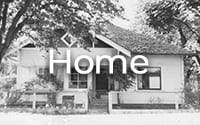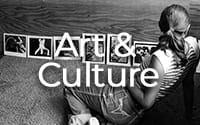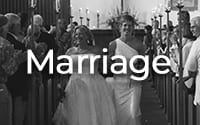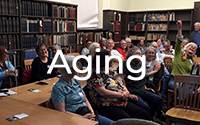AGING
AGING
How did we get to be elders? What does “aging as a lesbian” mean? Decades after they came to Eugene in their 20s, the narrators contemplate their futures. How might their histories of combatting homophobia and building a community on their own terms influence their next choices?

“Aging is a really interesting thing to do.”
– Diane DePaolis –
still trailblazing
Most of the Eugene narrators have retired and are adjusting to a new stage of their lives. With more free time, they continue to pursue their creative, intellectual, and political passions. While they haven’t lived or worked together for decades, many are thinking about how to leverage their history of community to chart the future. In their interviews they discuss aging with both humor and concern.
This is the first generation of “out” LGBT people to retire and navigate the living choices for old people. Moving into “retirement communities,” “assisted living facilities,” or “nursing homes” is a difficult and complex decision for most older Americans given the economic and social disruptions such a move makes and the lack of a strong social safety net. LGBT people, however, confront unique challenges as they age due to past and present discrimination. They are twice as likely to age alone and four times less likely to have children who might provide informal care. LGBT elders worry about having to live in facilities where other residents and staff may be at best ignorant of gay culture and at worst homophobic. There is currently almost no training for nursing home staff about the lives, histories and needs of gay, lesbian and transgender people, many of whom fear having to go back into “the closet” in order to protect their emotional or physical well-being. A recent survey conducted by the American Association of Retired Persons found that a majority of LGBT respondents are worried about potential neglect, abuse, harassment, or being forced to hide their identities as they access long-term care, either in their own homes or in nursing homes. In more progressive communities with sizeable LGBTQ communities, some organizations are addressing the needs of queer elders. For instance, SAGE offers advocacy and services for LGBT elders, focusing on reducing discrimination and disparities in medical care, housing, and long-term care as well as offering social connections and LGBTQ cultural programming.
The Eugene lesbian narrators imaginatively look to the future with insight gained from their past experiences creating alternative communities and families. Many of the narrators found that The Eugene Lesbian Oral History Project gave them the opportunity to “take stock” of their lives, for which they were grateful. Many used this moment to collect and donate their personal, political and business records and memorabilia to the larger collection now held in The University of Oregon Special Collections and Archives. This digital exhibit displays some of the photographs and memorabilia of lesbian Eugene.

FOR TEACHING AND RESEARCH
Ideas
Visit the Eugene Lesbian Oral History Project archive to read about Forget Me Nots, a memory loss support group affectionately known by members Isabel “Liz” Webb and Barbara Newman as “Dykes with Dementia.”











